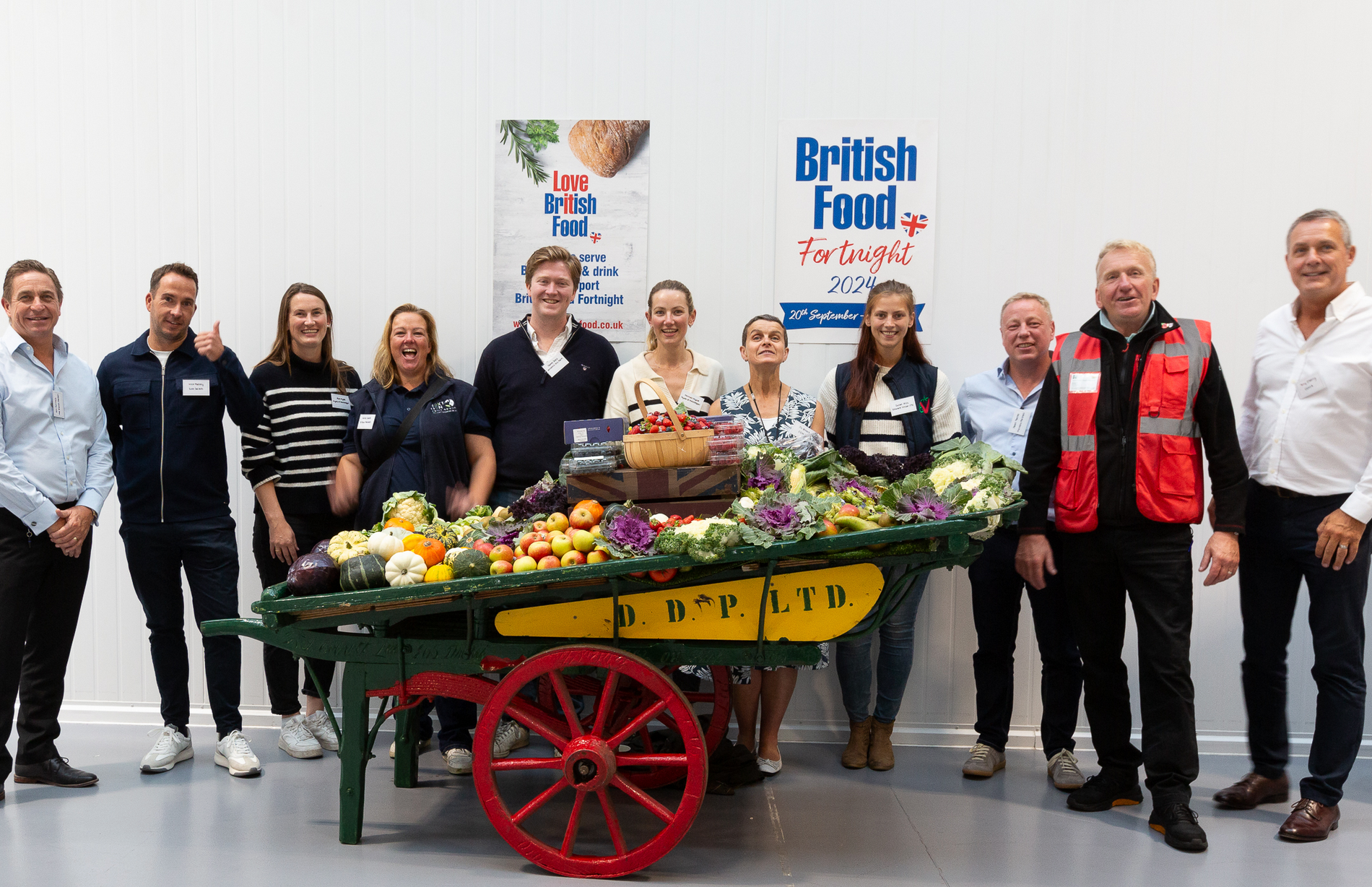British Food Fortnight 2024 has concluded its two-week celebration of the very best of British food with resounding success, embracing communities, retailers, and public sector institutions across the country. Kicking off at New Covent Garden Market in London, the fortnight was packed with lively events, promotions, and activities - all aimed at making British food accessible to everyone.
The festivities culminated in the National Harvest Service at Southwark Cathedral, supported by HM The Queen, and highlighted the nation’s commitment to sustainable and local food production.
This year marked the first British Food Fortnight with Morrisons as the Exclusive Retail Partner, who announced a three-year partnership with Love British Food. They trialled a number of initiatives, including taking customers to visit local farms and a British food module for their in-store tours for primary schools.
The event saw outstanding participation, from schools and universities to hospitals and retailers, showcasing the diversity and quality of British food. Thousands of caterers crafted special menus to highlight British ingredients, reinforcing the nation's rich culinary heritage.

Community Engagement and Public Sector Participation:
This year’s British Food Fortnight saw unprecedented participation from public sector institutions, including 100s of schools, 10 universities, and 35 hospitals. These institutions joined the celebration by featuring British produce in their meals, further promoting the importance of nutritious, seasonal, and locally sourced food.
The event’s impact was bolstered in advance by a series of farm visits for NHS caterers, engaging more than 190 representatives from across 43 hospitals to learn more about sourcing and preparing fresh, British ingredients for their patients.
Alexia Robinson, Founder of Love British Food, praised the efforts of all involved.
“This year’s British Food Fortnight was one of the most successful to date. The level of enthusiasm, from community groups to retailers and public institutions, was incredible. It’s inspiring to see so many people come together to celebrate British food and ensure it is accessible to all. I want to pay special thanks to Morrisons, and all of our Official Partners for making the fortnight possible - without their support, it could simply not happen.“
Sam Stott, Senior Customer Planning Manager, Morrisons:
“We have really enjoyed working with Love British Food for the first year of our three year partnership. We have introduced some great Morrisons initiatives such as Farm Tours and have added a British Module to our instore primary school tours, both of which champion British food, farming and education. As we are the largest customer of UK farming this really aligns to our values. We are excited to see what else the partnership will bring.”
James Armitage, Marketing Director, Fresh Direct (UK):
"This was our first British Food Fortnight as a sponsor of Love British Food, and we were delighted with the outcome. It was the perfect platform for us to drive awareness of our commitment to British produce and highlight our growing range of top quality British fruit and veg. As well as providing some fantastic content for our PR and social campaigns, it was also a great catalyst for our sales teams to open conversations with customers about the value of having more British produce on the menu."
Cathy Amos, Head of Customer Marketing, Brakes:
“Brakes combined celebrating British Food Fortnight with hosting a foodie exhibition in the beautiful Hertfordshire countryside, the perfect venue for the celebration. The event included a round table Love British Food discussion, food demos and a presentation from Wild Farmed with some fabulous breads from The Bread factory. Other fantastic British suppliers included Whitby Seafoods, Callestick Farm ice cream, Fresh Direct produce, Yeo Valley and many more. The event was attended by more visitors than ever before.”
Derek Wright, Catering Services Manager, Blackpool Council:
“I’ve been inspired to see how many people have thrown themselves into celebrating British Food Fortnight this year in schools, colleges and universities across the country. I’m so proud to lead the Love British Food Education working group. It never ceases to amaze me with the creativity and passion shared from an amazing set of leaders from education catering.”
Jane Wills, Facilities Manager at Somerset NHS Foundation Trust:
"We are proud to be a part of British Food Fortnight and enjoyed celebrating the British products that are currently on our menu. We held a variety of celebrations, including tea parties and food tasting, which were enjoyed by patients and colleagues alike."
Rob Cass, Operations Manager, OCS Group:
“OCS has taken part in British food fortnight for many years but 2024 is our first year as proud partners of Love British Food .
The OCS team in all our Catering divisions have totally got on board with creative ideas like the Great Pie Challenge and British food featured every day on our menus. As part of the Love British Food Education working group, it was a pleasure to collaborate with the other members of Love British Food and gain ideas and inspiration on how to celebrate British Food Fortnight. British Food Fortnight 2024 has been truly amazing. My fantastic chefs and their teams along with myself have had such fun delivering everything from a giant Eton mess to food workshops and British food open evenings and celebrating everything on our menus from farmers’ fields to the sea. Cannot wait for British Food Fortnight 2025!!”
The Great British Pie Challenge:
A key highlight of British Food Fortnight was the introduction of the Great British Pie Challenge, which invited chefs and caterers from all sectors to craft pies using British ingredients. The winner of the challenge was a Beef, Potato, and Rosemary Pie created by the catering team at the University of Huddersfield.
The pie was made with locally sourced British beef, potatoes, and rosemary grown on the university grounds by students and staff.
Phil Howard, Michelin-starred chef and Love British Food Ambassador, commented on the winning pie:
“The winning pie was a well-made and well-conceived classic pie delivering everything you want from a pie – deep flavours, soft and tender textures within and harmonious seasonal flavours. This pie has all three in spades and would surely put a smile on any hungry face.”
Ben Bartlett, another judge and celebrated chef, added:
“This comforting, hearty pie was so popular it sold out with customers raving about the quality, presentation and flavours. A superb entry that makes the best use of locally grown fresh ingredients.”
The Winner receives a British Food hamper including a Steak box, courtesy of HG Walters; selection of fish, courtesy of Plymouth Fishing & Seafood Association and a fruit & veg box, courtesy of OCS.
British Food Fortnight Community Competition:
This year our competition has been incredible with a huge number of entries from communities all over the UK, all with the same aim to help make fresh, healthy British food available to all.
Nominations include emergency food banks, a community space with cooked meals for the elderly and vulnerable, food workshops delivering practical advice on cooking and budgeting, a school growing their own veg from seed for use in school and in food tech lessons, a Dementia café, breakfast, after school and holiday clubs for children, plus many more. Love British Food Ambassador Liz Earle, MBE; David Scott, Corporate Affairs Director and Alexia Robinson, Founder of Love British Food will judge the entries with a luxury personalised foodie experience courtesy of Morrisons up for grabs. The closing dates for entries is Friday 25th October and winner will be announced by 8th November.
British Food Fortnight Campaigns:
Love British Food’s key wishes for the new Labour Government that were announced during the fortnight at the same time as the Labour Party Conference.
Proposals that can be done now by Ministers within existing budgets:
- Cross-Departmental Collaboration: Establish cross-departmental cooperation on food policy to ensure cohesive approaches that connect food production with public health, education, and environmental sustainability.
- Prioritise Community Engagement Over Lobbying: Work closely with organisations, businesses, and community leaders who are actively delivering change on the ground, rather than focusing on lobbying groups.
- Move Beyond Targets: Instead of simply aiming for a target of 50% British food in the public sector, focus on a scheme that inspires and enables catering teams, food service organisations, and wholesalers to connect food procurement with nutritional outcomes.
- ‘Buy British’ Initiative: Encourage all food service organisations and wholesalers to feature a ‘Buy British’ category, similar to the supermarkets' ‘Buy British button,’ to promote and prioritise British produce.
Suggestions that will need reallocation of existing budgets:
- Food Education for All: Ensure that every primary school pupil knows where their food comes from, how to prepare it and that every secondary school pupil understands basic nutrition and the critical role of food in mental and physical health.
- Clearer Food Labelling: Implement clearer labelling to highlight food provenance and the link between how food is produced and its nutritional value. Consider reallocating funds from existing programs, such as Red Tractor, to support this initiative.
- Channel Government investment into promoting the benefits of eating seasonal, quality, local British food to the domestic consumer. Currently the majority of investment is geared to promoting British food to the export market.
Possible ambitious new proposals that will need policy amendments and budgets increasing:
- Free and Healthy School Meals: Provide free, healthy school meals for all children. At the very least, extend free school meals to all children on Universal Credit, and ring-fence the food allowance to ensure it is spent on high-quality, nutritious food.
- Investment in British Agriculture: Substantially invest in growing more fruits, vegetables, beans, and pulses. Encourage public institutions to incorporate these foods as part of a balanced menu, alongside less but better-quality meat.
Looking Ahead As British Food Fortnight continues to grow, the date for next year’s event has already been set: 26th September to 12th October 2025.
A huge Love British Food thank you to all of our Official Partners.
Aramark
Brakes
Harrison Catering Services
Essential Cuisine
Master Chefs of Great Britain
Chartwells Independent
Sodexo UK
New Covent Garden Market
Medirest
AtoZ
OCS
AB Fruits
BonCulina
Eat Game
Share:
You may also be interested in...














